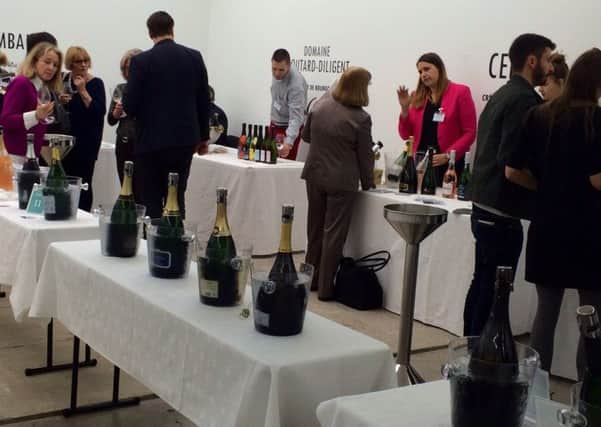RICHARD ESLING: The alternative to Champagne '“ and it's not Prosecco


This was a tasting of Crémant wines from producers all over France. Crémant is high quality sparkling wine, subject to regulations which are designed to ensure its quality, character and authenticity.
Unlike Prosecco, which is made in large volume pressurised tanks, Crémant wines are all made by the Méthode Traditionelle, identical to the method used for actual champagne, and virtually guaranteeing sparkling wines of elegance, character and individuality.
Advertisement
Hide AdAdvertisement
Hide AdThe secondary fermentation – the bit where the bubbles come from – takes place in the bottle and the wine then spends a variable amount of time in contact with the yeasty deposits, adding flavour and complexity.
The sparkling Crémant wines are made in many of the wine regions of France, including Burgundy, Bordeaux, Alsace and the Loire. They all have their own character and individuality, but also have inherent quality and finesse, something sadly lacking in many a Prosecco.
The wines are made normally using the grape varieties of the local area. Thus, Crémant de Bourgogne is often made using Chardonnay and Aligoté and may also include some Pinot Noir with the skins excluded, keeping the resultant wine white. Crémant de Bordeaux, on the other hand, uses Semillon and Muscadelle, sometimes including Sauvignon Blanc in the mix – all grape varieties associated with white Bordeaux wines. Crémant from the Loire is often made with the local Chenin Blanc or Cabernet Franc and Crémant from Alsace has to include Pinot Blanc.
Although these wines have been around for many years, particularly appreciated in France itself, the gourmet capital of the world, there are some changes afoot, primarily due to demands from the consumer, often led by fashion. Ackerman, a producer of high quality sparkling wines in the Loire, based in Saumur, has just released a brand-new wine with no addition of sulphites – firmly stating the fact on the label. This is very much in line with the current desire to reduce additives to food and drink products, to achieve more natural products.
Advertisement
Hide AdAdvertisement
Hide AdHowever, sulphites are normally added in order to protect the wine from oxidation and bacterial spoilage, thus without it, the winemaker has to ensure absolute cleanliness and a very high level of supervision and control in producing the wine – no bad thing at all.
The newly released wine is called ‘Esprit Nature’, made from Chenin Blanc by the traditional method and aged for 12 months on the lees. The fruit aromas have been wonderfully preserved and the wine is fresh, aromatic and soft, with intense fresh fruit character. Jean-Luc Baus, director of export for Europe, commented: “This modern style of wine is very fresh but very fragile, and requires impeccable winemaking conditions. I believe that the trend is for more and more wines to be produced without the addition of sulphites and modern technology now allows this possibility.”
Something else to remember with most Méthode Traditionelle wines from France, is that the vast majority are Brut, or dry. The somewhat confusing term on many Prosecco labels is ‘Extra Dry’. In fact, Extra Dry is nowhere near as dry as Brut, despite the terminology. This is yet another reason why Crémant wines are much closer in style to champagne than most Prosecco. Except for specific circumstances, the tendency for more experienced wine drinkers is to seek dry wines when it comes to white and sparkling and the alternative French sparklers have personality, sophistication and a certain “Je ne sais quoi!”.
Richard Esling BSc DipWSET is an experienced wine consultant, agent, writer and educator. An erstwhile wine importer, he runs a wine agency and consultancy company called WineWyse, is founder and principal of the Sussex Wine Academy, chairman of Arundel Wine Society and is an International Wine Judge. Twitter @richardwje. Visit www.winewyse.com.
Advertisement
Hide AdAdvertisement
Hide AdDon’t miss out on all the latest breaking news where you live.
Here are four ways you can be sure you’ll be among the first to know what’s going on.
1 Make our website your homepage
2 Like our Facebook page
3 Follow us on Twitter
4 Register with us by clicking on ‘sign in’ (top right corner). You can then receive our daily newsletter AND add your point of view to stories that you read here.
And do share with your family and friends – so they don’t miss out!
Be part of it.